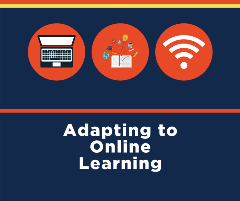If you are a student trying to adapt to online teaching and learning, here is an article that highlights helpful tips to get you prepared.
In response to the COVID-19 pandemic, universities and colleges across the world closed their doors to all staff and students. Classes were held online during the Pandemic and this was not the first time online learning was utilised.
Online learning was first introduced to students and teachers in the early 1980s. Since then, it has only improved to offer degree programs to those who cant physically attend classes in campus.

How to Prepare to Adapt to Online Learning and Adapting to Online Teaching
How to ease your stress and anxiety during a pandemic
It’s natural to feel anxious during this time, but you don’t want anxiety to take over your life during a period like this one. There are some simple things you can do to reduce your stress levels, as you learn how to adapt to online learning. The Canadian Psychological Association recommends the following:
Read Also: 5 Reasons Why International Students Choose To Study In Germany
Take a break from the news
Staying informed is important, but it can also be overwhelming and make you feel like the situation is out of your control. Instead, take certain hours of the day or night to check out the media or social networks.
Connect with others
Experts advise staying connected with peers, or fellow students, be it through virtual study groups, online games with friends, or daily phone calls with family members. Free apps like WhatsApp and Skype make it easy to connect.
Read Also: Top 10 Business Doctoral Programs online
Follow health and safety guidelines
Since we are talking about how you can adapt to the new online learning surge, you should also follow directions from the Public Health Authorities in your residential country to reduce your risk of getting the viral infection.
Move your body
Exercise is essential to your physical and mental health. As the warmer weather approaches, hiking or biking outdoors (while maintaining the protocols of the virus) is a great way to get some fresh air. Many universities and colleges offer domestic and international students, free virtual fitness classes, in their school gyms. limiting alcohol consumption, getting plenty of rest and eating healthy foods, also contribute to physical and mental health.
Ask for help
If stress or anxiety is hindering your daily activities, seek help. Many psychologists, family doctors, and social workers are virtually available during the pandemic.
Adapting to full-time online learning requires self-discipline, time management skills, and motivation. Even so, you still find it difficult to maintain your learning routine during these stressful times.
Read Also: 15 Free Courses Online With Certificates in 2020
How local and international students can adapt to online learning
Here are some tips to help you adapt to online teaching whether you are studying as an international student or in your home country:

Make sure you have a reliable internet connection
A reliable internet connection gives you reliable access to your online learning environment and helps you adapt. Be aware that technical problems and power outages can lead to connectivity failures. Therefore, write down your homework regularly and keep in touch with your teachers.
Google Drive, Google Classroom, Nearpod and Dropbox are free resources that you can use to learn and store your documents for learning in the cloud and automatically save them as you study online.
Reserve a special learning area
A dedicated study space is just as important as a reliable internet. Make sure the room is calm, organized, well-lit, preferably with natural light, and free from distractions.
Keep everything tidy by having all the supplies like pens, manuals, papers etc.) on hand. Make sure you have a charger on hand and that it is near an electrical outlet. Remember to turn off your phone and sign out of social networks. Ask family members or roommates to respect your study space to further limit distractions.
Treat online learning like learning in the classroom
Even if you are not physically in class, you should still plan a certain study time. This will help you adapt to online learning effectively. Use a calendar or planner to keep track of assignments and tests, and set reminders on your phone or use colour-coded sticky notes. Try to break your week down into manageable blocks of time each day so you can stay focused and productive.
Develop a routine
Now that you are studying online, you may need to adjust your daily routine. It can be tempting to wake up right before you enrol in your class, but experts say it’s best to do things that you normally would if you were physically on campus.
If you’ve usually had coffee and checked Twitter before class, go ahead. Did you go to the gym before you start reading, do an exercise at home?
Make sure you take breaks and have healthy snacks and water on hand while you study. During this quarantine period, it is even more important to take care of yourself mentally and physically.
Get involved and take part in group activities
Attend live online conferences and take part in group discussions. This will help you understand the material, especially if this course is your first distance learning experience. If possible, turn on your camera to encourage interaction with your classmates. Set up study groups to review the material together with Zoom or FaceTime.
If presentations are part of your classwork, dress professionally as if you were presenting in person. It is also important that you seek help from your teacher when needed.
Conclusion
Remember that the current situation won’t last forever, but online learning and teaching has come to stay.
Adapting to online teaching and learning will help you become academically flexible, and allow you the requirements to adapt to any form of study condition, that may come up in the future.

Leave a Reply